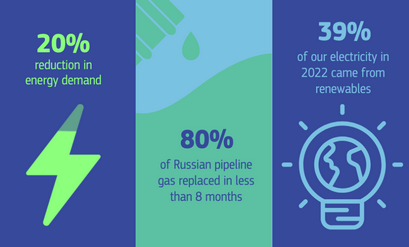Policy issues around the use of geothermal in the DHC systems at EU level
11/09/2023Philippe Dumas,
Madeline Vander Velde 1,
1EGEC Geothermal, 2 place du champ de
mars, Belgium-1050 Brussels
Geothermal
energy is a mature renewable energy solution which requires a combination of
favourable politics and regulation to become a mainstream source of heating,
cooling, electricity and sustainable lithium extraction. The EU’s revised
climate and energy targets for 2030 provide an important opportunity for
geothermal energy, particularly the emphasis on renewable heating and cooling.
Recent
developments of the climate crisis (especially the horrendous summer 2023
heatwave) combined with the invasion of Ukraine by Russia have added political
momentum to focus on renewable heating and cooling efforts.
The
invasion of Ukraine in February 2022 and the policy response, under the
umbrella of REPowerEU, provided additional opportunities to advance investment in
geothermal as well as raising political awareness of its benefits and
contribution to 2030 and 2050 climate and energy targets. The European
Commission’s REPowerEU plan outlined a series of proposals to move geothermal
from niche to a mainstream solution proposed to addressing the climate, energy
transition and Ukraine crises.

The EU
Solar Strategy called for a tripling of geothermal capacity by 2030, whilst the
EU Save Communication and legislative proposals outlined essential improvements
that create a market for geothermal heating, cooling, and power, in addition to
streamlining the process for capacity to come online. Geothermal supplies base
load electricity to stabilize the grid and secures the supply, all the while
being a renewable and environmentally friendly source of power. Geothermal
heating and cooling is key to decarbonise buildings and the industry, through
the usage of thermal underground storage (UTES). Sustainable extraction of
minerals (such as lithium) from geothermal brines contributes to securing critical
raw materials manufacturing within Europe.
The REPower
EU strategy also calls for 20 million geothermal and ambient heat pumps to be
installed in Member States by 2026 and nearly 60 million units by 2030. Some of
this financing should be used for an EU financial de-risking scheme to
accelerate investment in geothermal and other renewable heating solutions.
Carbon
pricing for household heat was a key feature of the political pact around the
current European Commission President, Ursula Von der Leyen’s, confirmation.
For the first time, heat is one of the central issues in a climate and energy
package. To ensure all roads lead to tangible conditions for geothermal
projects, further investment will need to materialise over the coming years.
The
political economy around clean technology, particularly electric transport, has
evolved rapidly since the Dieselgate scandal in 2015. This has moved the car
industry to the point where Volkswagen, the protagonist in the crisis, is the
first company to call for the new German government to phase out fossil fuels
and accelerate investment in electric transport and clean energy. This comes
months after European engineers won the race to patent sustainable extraction
of lithium from geothermal capacity without negatively impacting geothermal
energy operations.
The current
high prices for electricity and gas reinforce the need to stabilise the grid
with renewable base load electricity technologies such as geothermal. Being
also dispatchable, geothermal powerplant is the perfect enabler of the energy
transition in the power sector.
Four
obstacles need to be overcome in order for geothermal energy to become
mainstream between now and 2030:
i) Dedicated support structures to enable infant markets to reach maturity
ii) An escalation in the removal of fossil fuel direct and indirect subsidies
iii) Development of business models to attract fossil extraction companies to transition towards geothermal technology usage
iv) Harmonisation of licensing and permitting rules.
References
ADEME,
Couts des energies renouvelables et de recuperation en France 2019.
European
Commission., The European Green Deal (2019), COM2019 640 FINAL.
European
Commission., proposal for a Social Climate Fund (2021), 2021/206 (COD) FINAL.
European
Commission., Proposal to amend the Energy Efficiency Directive (2021),
2021/0203 (COD) FINAL.
European
Commission., Proposal to amend the Renewable Energy Directive (2021), 2021/0203
(COD) FINAL.
European
Commission., Staff Working Document accompanying the proposal to amend the
Renewable Energy Directive (2021), (SWD(2021)
European
Commission., REPowerEU Plan (2022) COM2022 230 FINAL.
European
Commission., EU Solar Energy Strategy (2022) COM(2022) 221 FINAL.
International
Energy Agency, Renewables 2021 (2021).
OECD.,
Companion to the Inventory of Support Measure for Fossil Fuels (2021).